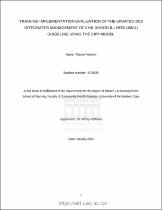Training implementation evaluation of the updated 2019 integrated management of childhood illness (IMCI) guideline using the CIPP model
| dc.contributor.advisor | Hoffman, Jeffrey | |
| dc.contributor.author | Petersen, Thanya | |
| dc.date.accessioned | 2023-05-04T10:08:12Z | |
| dc.date.available | 2023-05-04T10:08:12Z | |
| dc.date.issued | 2023 | |
| dc.identifier.uri | http://hdl.handle.net/11394/9836 | |
| dc.description | Magister Curationis - MCur | en_US |
| dc.description.abstract | The Integrated Management of Childhood Illness strategy, launched in the 1990’s by the World Health Organization and the United Nation’s Children Fund uses a clinical guideline to promote evidence-based assessment and treatment, aimed at reducing death, illness and disability in children under the age of 5 years, to improve child health indicators. By 1998, South Africa was one of 100 countries that had adopted IMCI as a strategy in Primary Healthcare facilities. In the Western Cape, after years of using outdated case exercises that were misaligned to the latest IMCI guidelines, the WC Provincial training unit, named the People Development Centre, adapted a selection of cases derived from the 2009 National case exercises, in an effort to align it to the updated 2019 IMCI Guideline. | en_US |
| dc.language.iso | en | en_US |
| dc.publisher | University of the Western Cape | en_US |
| dc.subject | CIPP model | en_US |
| dc.subject | Nursing | en_US |
| dc.subject | World Health Organization (WHO) | en_US |
| dc.subject | Children | en_US |
| dc.subject | Disability | en_US |
| dc.title | Training implementation evaluation of the updated 2019 integrated management of childhood illness (IMCI) guideline using the CIPP model | en_US |
| dc.rights.holder | University of the Western Cape | en_US |

